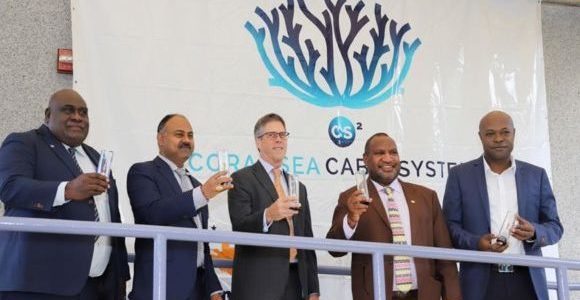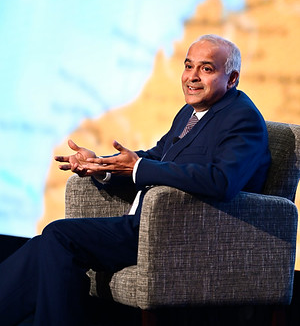It is critical Papua New Guinea does not squander the opportunities provided by the Coral Sea Cable System, says the Chair of the Business Council of PNG’s Internet Working Group, Sundar Ramamurthy.

Prime Minister James Marape officially launches the Coral Sea Cable in Port Moresby in June 2020, in the presence of Australian High Commissioner to PNG Jon Philp, and Minister for Information and Communication Timothy Masiu, Minister for State Enterprises Sasindran Muthuvel and PNG Dataco CEO, Paul Komboi. Credit: PNG Dataco
Papua New Guinea is at a crossroads with the development of its internet services and any mistake could mean ‘it’ll be another 20 years wasted’.
That’s according to Sundar Ramamurthy, CEO of Sola PayGo and Chair of the Business Council of PNG’s Internet Working Group, who was talking at the recent joint Business Council of PNG/Bank South Pacific PNG Business Digital Commerce Forum.
Ramamurthy, a former CEO of state-owned telco Bmobile, said PNG’s Government cannot waste the opportunity currently before them with the arrival of the Coral Sea Cable System (CS2) because ‘cheaper internet and cheaper data have a massive impact on the country’.
He expressed concerns that market conditions in PNG – a concentrated retail market dominated by a single player (Digicel) and state-owned enterprises’ monopoly on fibreoptic cables – led to higher data prices. He said PNG was not making the most of the arrival of the Coral Sea Cable cable and referred to the country’s near neighbour as a model.
‘The Solomon Islanders did not waste the opportunity,’ he said. ‘If you look at where the Solomon Islands is today compared to where they were a year ago; they were 20 years behind us a year ago and now they are ahead of us, since the CS2 cable came in.’
The 4700 km cable between Australia, PNG and Solomon Islands, was completed in December 2019, with state-owned wholesaler PNG Dataco responsible for connecting the cable domestically. Recent analysis suggests data prices in PNG have not yet fallen as far as expected this year.
Making progress, not money
Rather than treat it as a profit centre, Ramamurthy said PNG needed to treat the CS2 cable the same way it did other enabling infrastructure, like roads and bridges.
‘You measure the outcome as an increase to GDP and what people can do on top of it, not [say] “the bridge cost me 100 million bucks, so let me put a toll on it”. We don’t put a toll on the Highlands Highway but this road is the road we are going to be using for the next 20-to-30 years, which is the lifespan of the fibreoptic cable.’
‘We need to treat the CS2 cable as an enabler for the country and not a cost centre.’
He expressed concerns that the commodification of the cable, which had been provided at a heavily subsidised cost to the country due to Australian aid, would mean that the benefits of the cable will be lost.
‘You can reduce the cost of wholesale price, but have absolutely no impact on retail and that’s what you get in an imbalanced market, so even if you gave the CS2 fibre cable away for free I would guarantee your price of internet doesn’t drop because the wholesale cost is a component of the retail cost,’ he said.
‘Therefore the only credible way we have [to reduce costs] is we need to treat the CS2 cable as an enabler for the country and not a cost centre. If you take something for free and you put into a proprietary limited company and say “make money”, then it is pretty obvious they are going to charge for it.’









Speak Your Mind